Related Research Articles
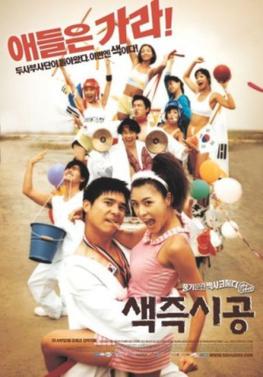
Sex Is Zero is a 2002 South Korean film written and directed by Yoon Je-kyoon, starring Im Chang-jung and Ha Ji-won. In the style of American gross-out comedies like American Pie, it follows the exploits of a group of college students, which eventually takes a serious turn. Sex Is Zero sold 4,089,900 tickets in South Korea, making it the fifth most popular film of 2002.

Guardian Angel is a 2001 South Korean television drama series starring Song Hye-kyo and Kim Min-jong. It aired on SBS from August 1 to September 20, 2001 on Wednesdays and Thursdays at 21:55 for 16 episodes.

Heaven & Earth is a 2007 South Korean television series starring Park Hae-jin, Han Hyo-joo, Lee Joo-hyun, Kang Jung-hwa, and Hong Soo-ah. It aired on KBS1 from January 15 to August 31, 2007 on Mondays to Fridays at 20:25 for 165 episodes.
Golden Apple is a South Korean television series starring Park Sol-mi, Kim Ji-hoon, Ji Hyun-woo, Go Eun-ah and Jung Chan. It aired on KBS2 from November 16, 2005 to February 23, 2006 on Wednesdays and Thursdays at 21:55 for 30 episodes. The story is about four siblings living in a village in the 1960s, and a woman fighting to clear her dead father's name after he is wrongly accused of her stepmother's murder.

The Great King, Sejong is a 2008 South Korean historical television series depicting the life of the fourth monarch of Joseon, Sejong the Great. Considered one of the greatest kings in Korean history, Sejong created Hangul, the Korean alphabet. The series aired on KBS from January 5 to December 7, 2008, on Saturdays and Sundays at 21:30 for 86 episodes. Episodes 1 to 26 aired on KBS1, and episodes 27 to 86 aired on KBS2.

Empress Cheonchu is a 2009 South Korean period television series based on the title character, an actual historical figure and her lifelong struggle to protect the country her ancestors built. The granddaughter of Goryeo Dynasty founder Taejo Wanggeon, the empress ruled as the regent for her son Mokjong, the dynasty's seventh ruler. Determined to realize her ambitious goals for the kingdom of Goryeo, she dons armor, battles against foreign invaders, and tramples her lover, her son and brother in her rise to power.

Pasta (Korean: 파스타) is a 2010 Korean television series starring Gong Hyo-jin, Lee Sun-kyun, Lee Hanee and Alex Chu. The workplace romantic comedy is about the dreams and struggles of a young woman who aspires to become an elite chef. It aired on MBC from January 4 to March 9, 2010 on Mondays and Tuesdays at 21:55 for 20 episodes.

Sungkyunkwan Scandal is a South Korean historical drama starring Park Yoo-chun, Park Min-young, Song Joong-ki, and Yoo Ah-in. Directed by Kim Won-seok and written by Kim Tae-hee, it is based on Jung Eun-gwol's bestselling 2007 novel The Lives of Sungkyunkwan Confucian Scholars. It aired on KBS2 from August 30 to November 2, 2010 on Mondays and Tuesdays at 21:55 for 20 episodes.

Secret Garden is a 2010 South Korean television drama starring Ha Ji-won, Hyun Bin, Yoon Sang-hyun, and Kim Sa-rang. It aired on SBS from November 13, 2010 to January 16, 2011, on Saturdays and Sundays at 22:00 (KST) for 20 episodes.

You Are My Destiny is a South Korean television series television series that aired on KBS1 from May 5, 2008 to January 9, 2009 on Mondays to Fridays at 20:25 for 178 episodes. Starring Im Yoon-ah, Park Jae-jung, Lee Ji-hoon and Gong Hyun-joo, the rating of the drama started at more than 20% in the first episode, and kept increasing. It reached a peak viewership rating of 41.6% in its final episode and was a huge success overall in Korea and many other Asian countries.

City Hunter (Korean: 시티헌터) is a 2011 South Korean television series based on the Japanese manga series of the same name written and illustrated by Tsukasa Hojo, starring Lee Min-ho, Park Min-young, Lee Joon-hyuk, Kim Sang-joong, Kim Sang-ho, Hwang Sun-hee, Goo Hara, Chun Ho-jin, and Lee Kwang-soo. It premiered on May 25, 2011, on SBS and finished broadcasting on July 28, 2011. This show was successful in Europe and paved way for Lee Min-ho's popularity in Europe.
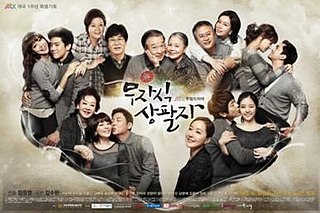
My Kids Give Me a Headache is a 2012 South Korean television series, starring Lee Soon-jae, Kim Hae-sook, Yoo Dong-geun and Uhm Ji-won. It is about three generations of the Ahn family who are all living in one house in the suburbs of Seoul, and how they deal with the societal discrimination that their smart and highly educated, eldest granddaughter faces when she becomes a single mother. It aired on cable channel jTBC from October 27, 2012 to March 17, 2013 on Saturdays and Sundays at 20:50 (KST) for 40 episodes.

Jejungwon is a 2010 South Korean period medical drama television series about the founding and early years of Jejungwon, the first modern Western hospital in the Joseon Dynasty. The hospital was founded in 1885 and began accepting a small class of students for training in Western medicine.

Can We Fall in Love, Again? is a 2014 South Korean television series starring Eugene, Uhm Tae-woong, Kim Yoo-mi, Choi Jung-yoon and Kim Sung-soo. It aired on JTBC from January 6 to March 11, 2014 for 20 episodes.
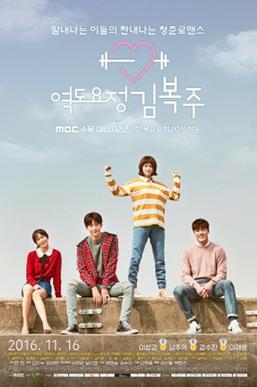
Weightlifting Fairy Kim Bok-joo is a 2016–2017 South Korean television series starring Lee Sung-kyung in the title role, with Nam Joo-hyuk. It is a coming-of-age sports drama, inspired by the life of Olympic gold-medalist Jang Mi-ran. It aired on MBC every Wednesday and Thursday at 22:00 (KST) from November 16, 2016, to January 11, 2017.
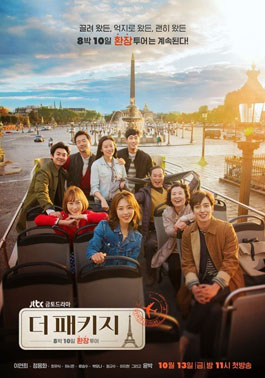
The Package is 2017 South Korean television drama starring Lee Yeon-hee, Jung Yong-hwa, Choi Woo-shik, and Yoon Park. It aired in both South Korea and China. In South Korea, it aired on JTBC every Friday and Saturday at the 23:00 (KST) from October 13, 2017.

Black is a 2017 fantasy-thriller South Korean television series starring Song Seung-heon, Go Ara, Lee El, and Kim Dong-jun. It aired on OCN from October 14 to December 10, 2017, every Saturday and Sunday at 22:20 (KST).
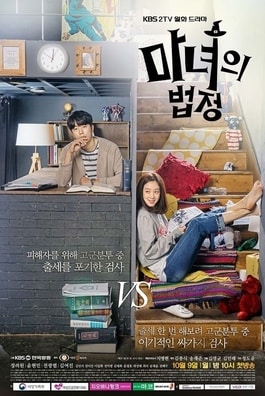
Witch at Court is a 2017 South Korean television series starring Jung Ryeo-won and Yoon Hyun-min. An investigative law that tells the story of a snobbery prosecutor being appointed as a special prosecutor in charge of sex crimes. It aired on KBS2 from October 9 to November 28, 2017, every Monday and Tuesday at 22:00 (KST).
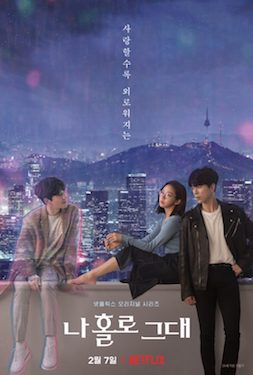
My Holo Love is a 2020 South Korean television series starring Yoon Hyun-min and Ko Sung-hee. It was released on Netflix on February 7, 2020.

My Unfamiliar Family is a 2020 South Korean television series starring Jung Jin-young, Won Mi-kyung, Choo Ja-hyun, Han Ye-ri, Shin Jae-ha and Kim Ji-seok. It aired on tvN from June 1 to July 21, 2020.
References
- ↑ "Announcing the 2022 PEN America Literary Awards Winners". PEN America. 2022-02-28. Retrieved 2023-07-22.
- 1 2 "Yoon Choi Has Mastered the 'Glass of Wine' Story". Kirkus Reviews. Retrieved 2023-03-12.
- ↑ "A Conversation with Yoon Choi". www.koreasociety.org. Retrieved 2023-03-12.
- ↑ "Anaheim author Yoon Choi says raising four children helped shape the stories in 'Skinship'". Orange County Register. 2021-08-15. Retrieved 2023-03-12.
- ↑ Le, Tien (October 14, 2021). "The Oxford English Dictionary Adds Korean Words". npr.org. Retrieved 2023-03-12.
- ↑ "supp3-3127794.pdf". doi:10.1109/tcst.2021.3127794/mm2 . Retrieved 2023-03-12.
{{cite journal}}: Cite journal requires|journal=(help) - ↑ "Soapberry Review" . Retrieved 2023-03-12.
- ↑ "Book Review: "Skinship" – APALA" . Retrieved 2023-03-13.
- ↑ "Skinship: Stories | Washington Independent Review of Books". www.washingtonindependentreviewofbooks.com. Retrieved 2023-03-13.
- ↑ Corrigan, Maureen (August 25, 2021). "Think You Know Where the Stories In 'Skinship' Are Going? Think Again". npr.org. Retrieved March 12, 2023.